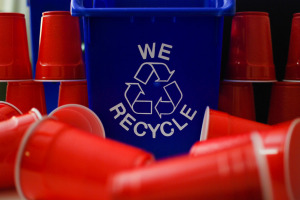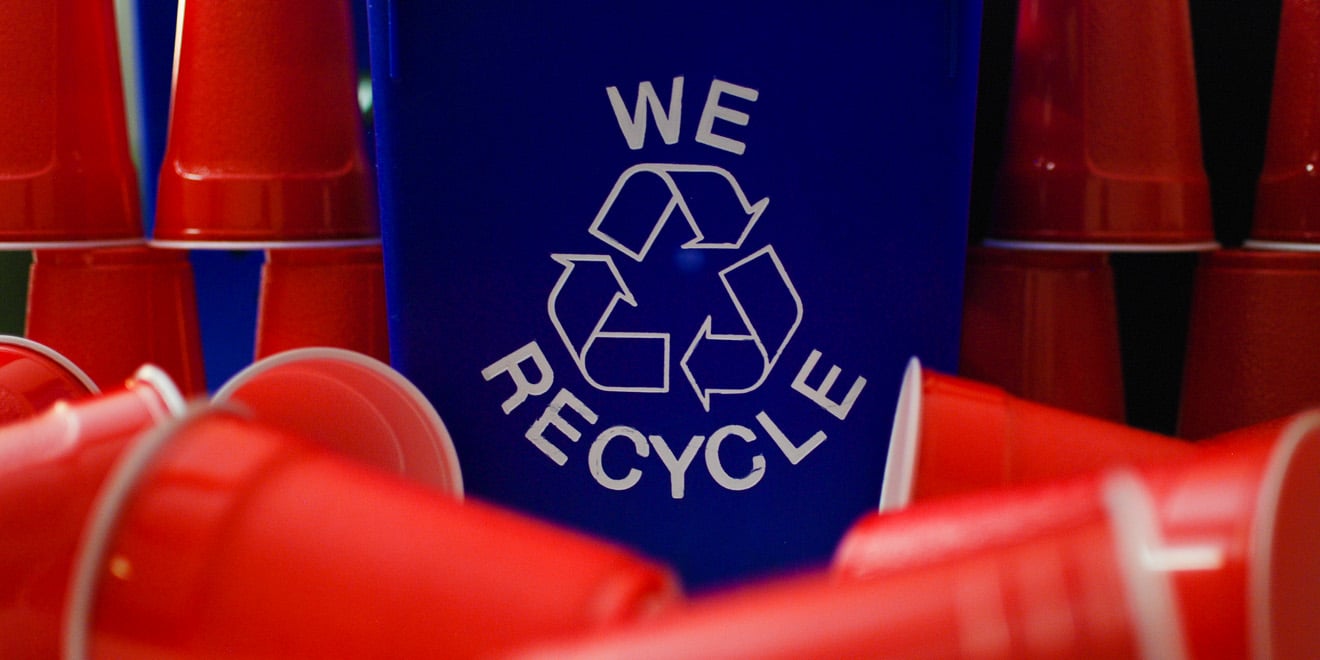
As you walk toward the kitchen of Kappa Sigma on Sunday morning, it’s hard to miss the empty handle of Deep Eddy Ruby Red Vodka sitting atop the piano and the sea of Bud Light cans tracing a path to the trash can. Looking inside that overstuffed waste bin, you will see a potpourri of Sierra Nevada glass bottles, plastic red solo cups, cardboard from 30-racks and, inevitably, more metal Bud Light cans.
Although this particular scenario may have been the result of an all-campus party the night before, it is not atypical of the way waste is handled at Kappa Sigma and other fraternities.
Enter David Wintermeyer ’17, the community service chair of the fraternity, who has teamed up with R&DE Sustainable Living, PSSI/Stanford Recycling, the Green Living Council and the Stanford Green Store to initiate the first residence on campus outfitted for zero waste.
The project, set to roll out on Nov. 19, will add 82 bins to collect compost and improve recycling collection for the inside as well as an additional compost cart, three plastic/metal/glass carts and one paper recycling cart for the outside. Estimates say the implementation of the project will cost about $4,000, according to Wintermeyer, but will save more than $6,000 annually from reduced landfill service.
“The recycling bins we had were shared with Theta Delt and were essentially hidden,” Wintermeyer said. “It started with an ask for recycling bins and now it’s blown up into something really big.”
When approached by Wintermeyer, Julie Muir, the Zero Waste program manager, educator and community liaison at PSSI/Stanford Recycling, immediately saw the benefit in the program.
“Because there are health and safety issues, regulatory issues, all these various things, we don’t sort through the trash,” Muir said. “So it’s really important to not put that stuff there and to have bins in really convenient locations to separate your materials.”
Isabelle Barnard ’16, co-president of the Green Living Council, agrees that convenience is key to reducing waste.
“One of the things they’ve really been trying to work on — and David and R&DE have been doing a really great job of — is tailoring a recycling program to the specific house,” she said. “Essentially, the most effective way to get people to implement sustainable behavior changes is just making it as unbelievably easy as possible — easier than the alternative.”
Another issue Barnard saw the need to address was separating materials. To account for this, all 44 student rooms in the residence are receiving three-stream recycling bins to separate landfill, paper and plastic, metal and glass.
“A lot of times, when people don’t recycle things properly or dispose of their waste properly, it’s just because they don’t know, because it’s really confusing,” she said.
Fraternity members are also being provided with educational fliers on how to use their in-room “multi-recyclers.”
Still, perhaps the biggest problem stems from red solo cups, which contain a dye that prevents recycling under the current process Stanford residences use. To resolve this issue, Wintermeyer said that Kappa Sigma has replaced these college staples with clear, plastic cups, which are recyclable.
Muir hopes that the project will inspire other fraternities to strive for zero waste, and perhaps serve as a model for all residences to follow suit.
“I think we’re just really looking to this as a pilot to see how this goes, and if it goes well, I think [R&DE] Housing hopes to do it in other locations, because it’s really getting people the tools they need to participate in a zero-waste program,” she said.
Barnard said she would like to see Stanford’s Greek life serve not only as a model for other residences here at Stanford, but fraternities and sororities on other campuses as well.
“This is another opportunity for Stanford in general, for Stanford’s Greek life to then set an example for other campuses around the country,” she said.
Contact Tristan Vanech at tvanech ‘at’ stanford.edu.
